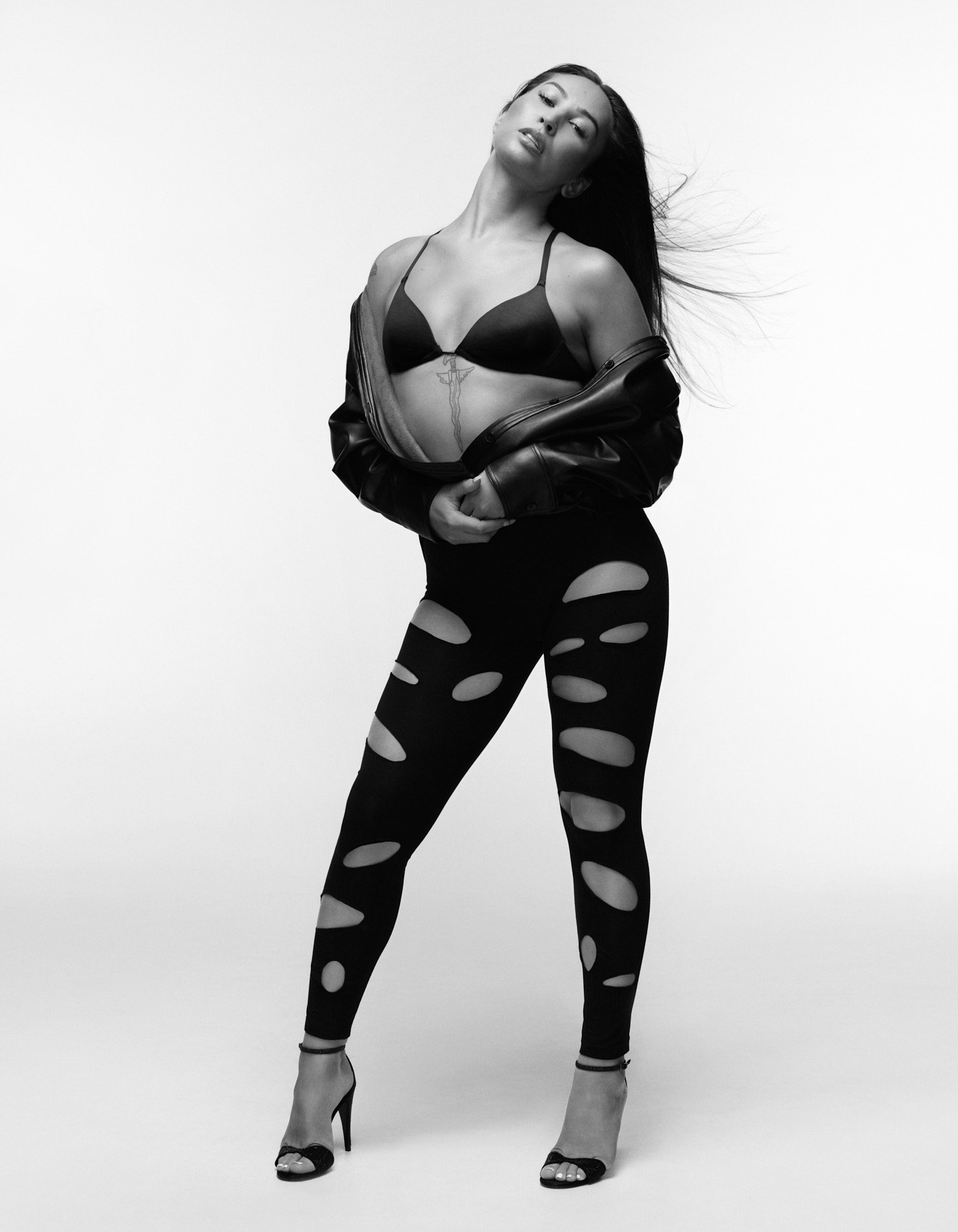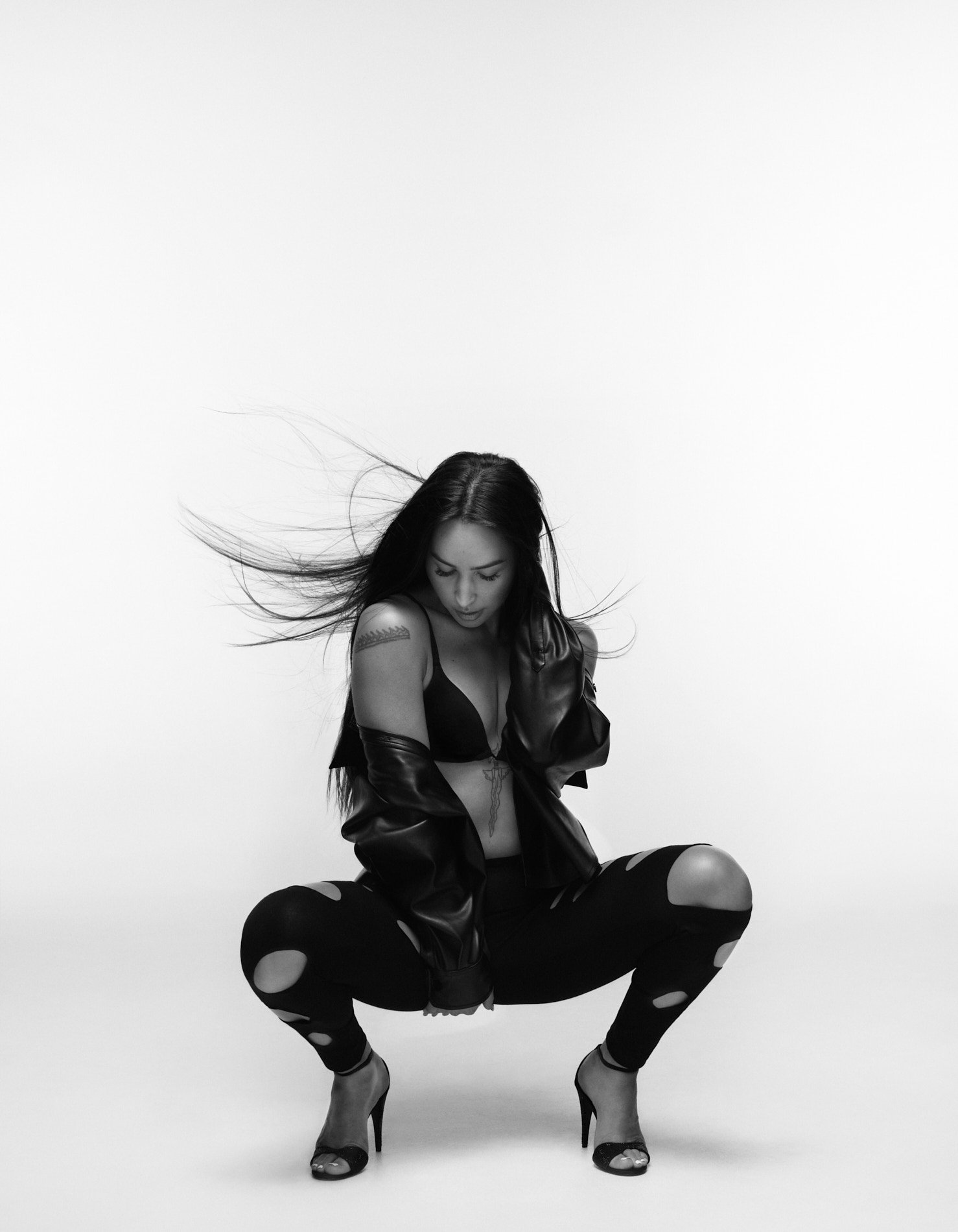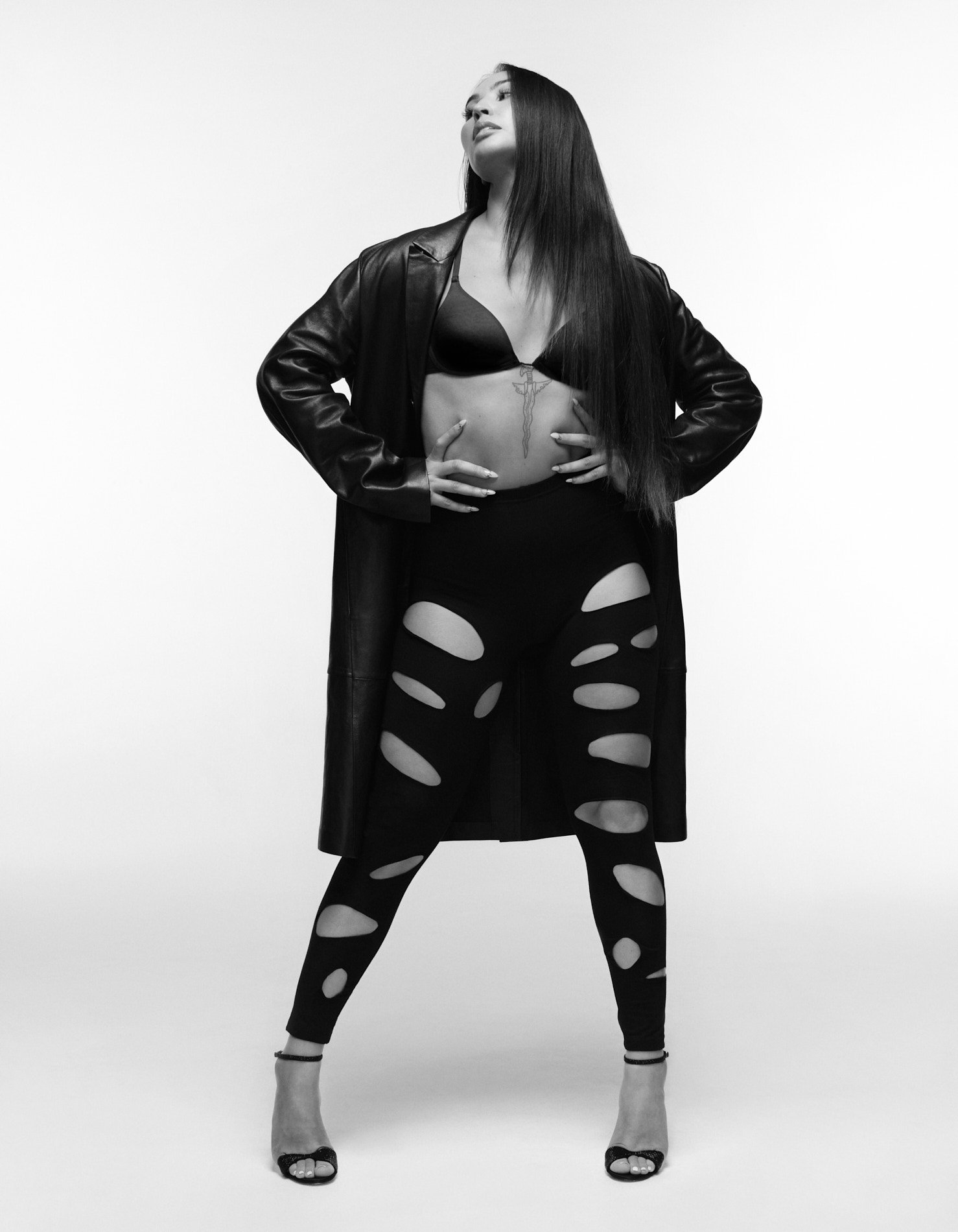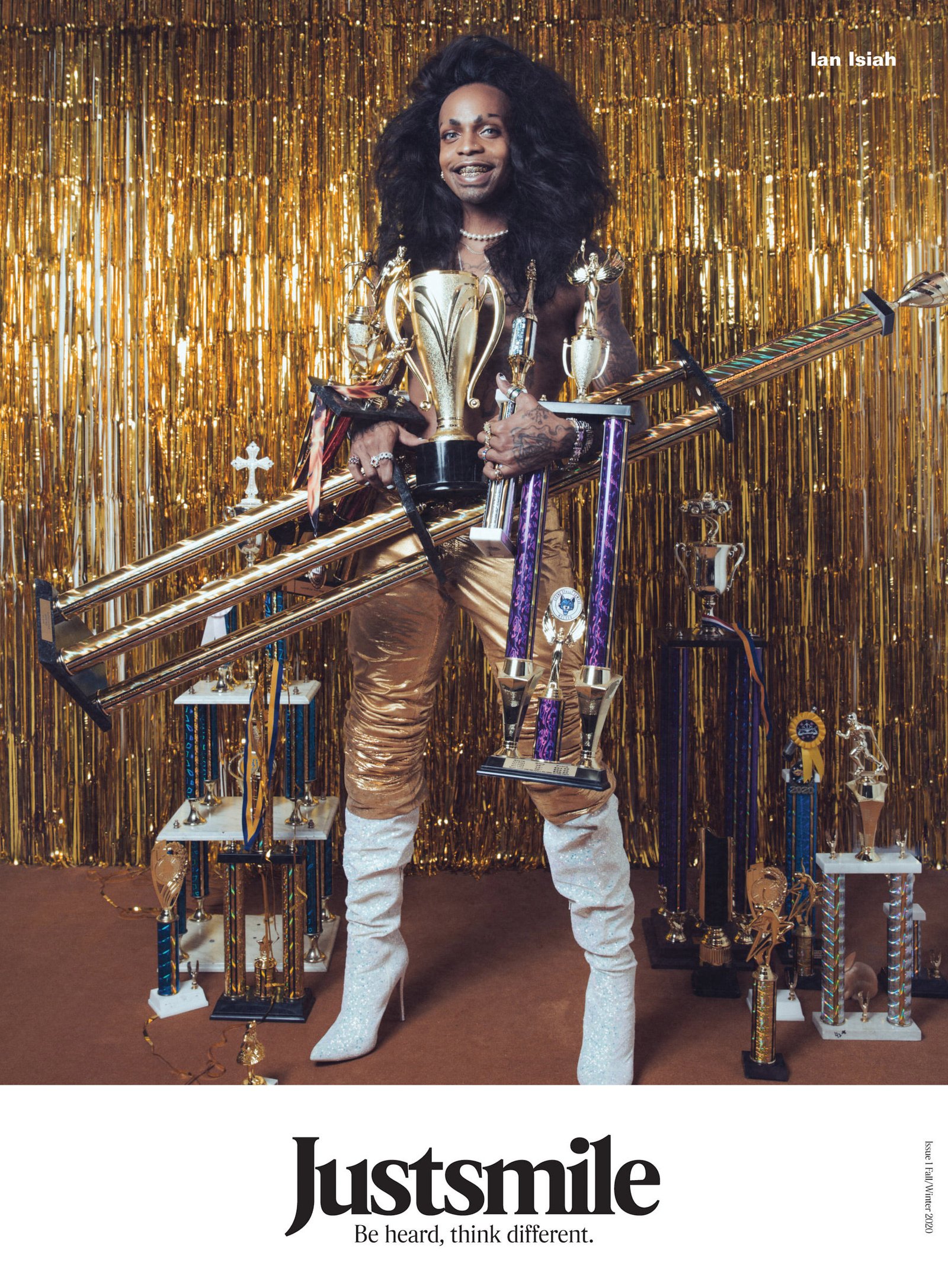Bridging the gaps with Bhenji Ra
Mother of the House of Slé, multi-disciplinary artist and abolitionist—on why community means everything to her.
This story was originally published in Justsmile Issue 1 FW20.
Photography Bryce Thomas
Styling Kevin Hunter
Text Erin McFadyen

Bhenji wears vintage top from ROUTE 66. Customized leggings stylist’s studio. Bra Bhenji’s own. Sandal with ankle strap EMPORIO ARMANI.
On practice: My name is Bhenji Ra, and I’m the mother of the House of Slé. I'm an artist. I'm an abolitionist. I’m also a dancer — it’s all in there. The different elements of my practice intersect really beautifully. A lot of my practice is based around finding the beauty within contradiction. A lot of it as well has been about bridging the gaps between communities and bodies, and working within intersectional frameworks, blending and basically dissolving the binary that keeps us separated.
On nature: I’m really excited to be learning about permaculture. I think everybody's been connecting with nature a little bit recently, and I've been finding a lot of healing that’s come from nature. My relationship with the country that we're on- and plants- has been growing a lot. Permaculture has been interesting to me because I have a huge interest in how we treat the land and how we leave the land; everything is about regeneration and energy cycles. All these critical ideas about permaculture, you can apply to your life and your relationship with everything: nothing is disposable, everything has value.
Recently, I spent six weeks down in the country that I grew up on, which is of the Yuin nation. I was camping and I found myself on a permaculture farm. Now I'm doing a permaculture course in a couple of months — I really want to be a farm girl. My dream is to find my way back to my mom's homeland, which is the Philippines, and go into farming.
I’ve been thinking about what kind of like skills you need for a future that is so uncertain. It’s one thing to be community driven, but how do you also look after a community? How do you nurture? How can we have longevity? I’m exhausted by the current pace of working. I’m turning my attention to what is instinctually important right now.
On sisters: My role model was my sister — she was 15 years older than me. I grew up watching her going through her lessons and becoming a young person in the world. She was the first person to introduce me to things like social work and community. She politicized the world for me. And I saw her experiences, how she walked in the world as a brown, queer femme, and I learned that having a voice was this tool to survive: speaking out was one way to keep on working against the dominant narratives. She taught me sisterhood as well: about nurturing and caring for women.

Bhenji wears vintage top from ROUTE 66. Customized leggings stylist’s studio. Bra Bhenji’s own. Sandal with ankle strap EMPORIO ARMANI.
On community: Community is, in a way, my lifeline. It's a tool for survival. And so it's important to me that most of my practice has been about how to be in right relation to each other. For me, it's a no brainer. Being an individual in the world, I can't survive. In a way, I'm so selfish about it: I carved out this family with everyone so that it could be for me — it's for my own survival as well.
So, I'm the mother of the House of Slé. When I moved to Sydney, I didn’t see a lot of young, queer people of color, especially young trans women and Asia Pacific women. But I knew that they were out there. So I wanted to build this space, I wanted to find them, I wanted to be in relationship with them. It was really just me five years ago being really dorky, finding the girls one by one. I think the through line for all of us was that we all had an affinity for dance. We started to create opportunities for ourselves to perform in clubs and institutions and galleries, and politicize those spaces. I wasn't the mother at the start. But within a couple of years we all took on our shapes and our roles within the house. And then suddenly, I was the mom. Yeah. And then I was like, ‘oh, I've been in labor for all this time, and I’ve now given birth to these girls.’
On conflict and strength: I don't try to romanticize community and family too much. I think people can see us and think oh, it's so glamorous, it’s so perfect. As if it were this polished thing. But I think I have to see value and beauty within the moments where we've had conflicts, where we've faced each other with differences, and we've separated and split it off and then we've come back together, and returned to each other. Finding a way to keep on returning back to each other has always been worth it. Us being together has just made us even smarter and greater. And we get a deep empathy and a stronger sense of self and resilience amongst each other. It's not fragile because it's been tested so much. I have to keep coming back to that. If we don’t we’ll grow a culture of avoiding conflict. I don’t want that. I want us to try to find the language.

Bhenji wears coat BALLY. Customized leggings stylist’s studio. Bra Bhenji’s own. Sandals with ankle strap EMPORIO ARMANI.
On the future: We’re leaving behind internalized capitalism. We’re saying goodbye to it; it hasn’t served us. It’s run us to the ground, it’s made us feel disposable, it’s questioned our value, it’s there basically to kill us.
What we’re bringing forward into the future is more boundaries. Boundaries help us learn about each other better. We want to feel safer in spaces, we want to feel like we’re not being instrumentalized, we don’t want to feel like we’ve been taken away from our center. Boundaries keep us centered, keep us whole.
On advice for her young self: I would tell my young self to keep dreaming. I was a big dreamer, and I was quite fearless, so I would say to keep that. And no matter how much the world will try you, or people will try you, you’re extremely valuable, your life matters, and you have a purpose in the world. Your difference is probably the thing that’s going to win over hearts, and it’s going to get you through — so embrace that diversity. And just keep on believing in the magic that you already know.
On what makes her smile: I love my interactions with all of my friends’ kids. There’s something so great about tapping into the younger generation, their humor and sense of the world, and their perspective on things. They're also really instinctual — they have this great practice of joy, and they’re unapologetic about pleasure. Let’s follow that — let’s bring on these senses of joy and pleasure.
